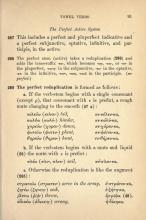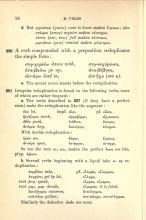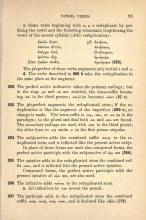287. This includes a perfect and pluperfect indicative and a perfect subjunctive, optative, infinitive, and participle, in the active.
288. The perfect stem (active) takes a reduplication (§ 289, below) and adds the tense suffx -κα-, which becomes -κη-, κει-, or -κε- in the pluperfect, -κω:η- in the subjunctive, -κο- in the optative, -κε- in the infinitive, -κοτ-, -κως, -κυιᾱ in the participle. (κα- perfect)
289. The perfect reduplication is formed as follows.
a. If the verb stem begins with a single consonant (except ρ-), that consonant with ε- is prefixed, a rough mute changing to the smooth (§ 47.a).
| Present | Perfect |
| κελεύω (κελευ-) bid |
κε-κέλευ-κα |
| κωλῡ́ω (κωλῡ-) hinder |
κε-κώλῡ-κα |
| χορεύω (χορευ-) dance |
κε-χόρευ-κα |
| φυτεύω (φυτευ-) plant |
πε-φύτευ-κα |
| θηρεύω (θηρευ-) hunt |
τε-θήρευ-κα |
b. If the verb stem begins with a mute and liquid (§ 39) the mute with ε- is prefixed.
| Present | Perfect |
| πλέω (πλυ-, πλευ-) sail |
πέ-πλευ-κα |
c. Otherwise the reduplication is like the augment (§ 265).
| Present | Perfect |
| στρατεύω (στρατευ-) serve in the army |
ἐ-στράτευ-κα |
| ζητέω (ζητε:η-) seek |
bἐ-ζήτη-κα |
| ῥῑ́πτω (ῥῑφ-) throw |
ἔρ-ρῑφα (§ 48) |
| ἀδικέω (ἀδικε:η-) wrong |
ἠ-δίκηκα |
d. But γιγνώσκω (γνο:ω-) (come to know) makes ἔ-γνωκα; also
| Present | Perfect |
| κτάομαι (κτα:η-) acquire |
κέ-κτημαι |
| πῑ́πτω (πετ-, πτω-) fall |
πέ-πτωκα |
| μιμνήσκω (μνη-) remind |
μέ-μνημαι |
290. A verb compounded with a preposition reduplicates the simple form.
| Present | Perfect |
| συγ-χορεύω dance with |
συγ-κεχόρευκα |
| ἀνα-βαίνω go up |
ἀνα-βέβηκα |
| εἰσ-άγω lead in |
εἰσ-ῆχα (see a below) |
a. The accent never stands before the reduplication.
291. Irregular reduplication is found in the following verbs, some οf which are rather frequent.
a. The verbs described in § 267 (if they have a perfect stem) make the reduplication like the augment.
| Present | Imperfect | Perfect |
| ἐάω let |
εἴων | εἴᾱκα |
| ἐργάζομαι work |
εἰργαζόμην | εἴργασμαι |
| ὠθέω push |
ἐ-ώθουν | ἔωσμαι |
| ὠνέομαι buy |
ἐωνούμην | ἐώνημαι |
With double reduplication
| Present | Imperfect | Perfect |
| ὁράω see |
ἑώρων | ἑώρᾱκα |
| ἀν-οίγω open |
ἀν-έῳγον | ἀν-έῳχα |
So too the root ικ-, εικ-, makes the perfect ἔοικα (am like), plup. ἐῴκειν.
b. Several verbs beginning with a liquid take ει- as reduplication.
| Present | Perfect |
| λαμβάνω take |
εἴ-ληφα εἴ-λημμαι |
| λαγχάνω get by lot |
εἴ-ληχα |
| δια-λέγομαι converse |
δι-εί-λεγμαι |
| συλ-λέγω gather |
συν-είλοχα συν-εί-λεγμαι |
| Root | Perfect |
| ῥε:η- speak |
εἴρηκα εἴ-ρημαι |
| μερ-, μαρ- divide |
εἵ-μαρται it is fated |
Similarly the defective εἴωθα (am wont).
c. Some verbs beginning with α-, ε-, ο- reduplicate by prefixing the vowel and the following consonant, lengthening the vowel of the second syllable (Attic reduplicalion).
Also ἐγείρω (wake) ἐγρ-ήγορα (§ 332).
The pluperfect of these verbs augments only initial α- and ο-.
d. The verbs described in § 268.b take the reduplication in the same place as the augment.
| Present | Perfect |
| ἀκούω hear |
ἀκ-ήκοα |
| ἐλαύνω drive |
ἐλ-ήλακα |
| ἐλέγχω test |
ἐλ-ήλεγμαι |
| ὀρύττω dig |
ὀρ-ώρυχα |
292. The perfect active indicative takes the primary endings; but in the singular -μι and -σι are omitted, the tense suffix becoming -κε- in the third person; -κα-(ν)σι becomes -κᾱσι (§ 51.c).
293. The pluperfect augments the reduplicated stem; if the reduplication is like the augment of the imperfect (§ 289.c, above), no change is made. The tense suffix is -κη-, -κει-, or -κε- as in the paradigm; in the plural and dual both -κε- and -κει- are found. The secondary endings are used, with -σαν in the third plural; the older form in -κη omits -ν in the first person singular.
294. The subjunctive adds the combined suffix -κω:η- to the reduplicated stem, and is inflected like the present active subjunctive. In place of these forms are used also compound forms, the perfect active participle with the subjunctive of εἰμι (am) (§ 384).
295. The optative adds to the reduplicated stem the combined suffix -κοι- and is inflected like the present active optative.
Compound forms, the perfect active participle with the present optative of εἰμι (am) are also used.
296. The infinitive adds -κέ-ναι to the reduplicated stem.
a. All infinitives in -ναι accent the penult.
297. The participle adds to the reduplicated stem the combined suffix -κως, -κυιᾱ, -κος, -κοτ-, and is declined like εἰδώς (§ 172).



